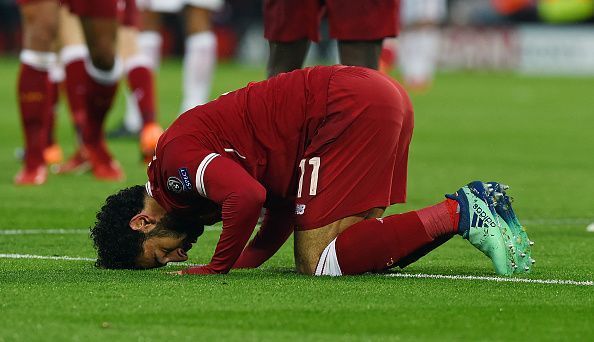Mo Salah knelt with his forehead pressed against the turf is now one of the most recognizable images in English football and almost a microcosm of the worshiping fans that surround him in the stands.
It has been such a routine occurrence this season, 44 times to be exact, that its powerful symbolism may be underappreciated. Salah may just be getting on with his job but, intentionally or not, he is doing more to dismantle racial prejudice in Britain then any activist could ever dream of.
After his £36.9m switch from Roma last summer Salah turned into a one-man footballing institution almost overnight, bringing a level of hysteria to Liverpool that hadn't been witnessed since Beatlemania.
Acts of devotion vary from packed Merseyside bars chanting that ‘if he scores another few, then [they’ll] be Muslim too,’ to children around the country performing ‘sajdahs’, an Islamic act of prostration, as goal celebrations. Elder ladies are even getting in on the act, popping up in the streets to serenade their ‘Egyptian King.’
But however loved Salah may be on British shores, it pales in comparison with the adoration bestowed on him in his homeland.
The Egyptian King
Salah’s rise to stardom in Egypt, of course, coincides with his prolific scoring accolades, but it is his humility and charitable nature that has propelled his popularity to stratospheric heights.
Salah returns to his village of Nagrig at least once a year where he has an ever-growing list of charitable donations. Although Salah prefers to keep his philanthropy a secret, locals are less coy about their love for their hometown hero. Any child kicking a football around one of the pitches Salah has built would be quick to tell you they aspire to be like the man who recently told them to 'never stop dreaming, never stop believing' after winning the African Player of the Year award.
"Salah's now a guide for a lot of the young people who are learning from him -- he's given them a lot of motivation," commented an Egyptian fan to CNN. "He's doing advertising about stopping drugs and smoking for youth in Egypt, so it's perfect. He's doing a very good job on the pitch as well in society."
To gain a rough insight into Salah's popularity, one only has to view the results of the recent presidential elections where Salah came in second place after his name was written on over a million ballots.
However, this also alludes to political unrest in Egypt, one of many problems in a country where protests can be volatile and sporadic. But for at least 90 minutes every week, Salah exudes his powers to unite the country.
The nation watched on proudly as he grabbed one final goal of the season against Brighton before the league campaign ground to a halt, offering Salah a well earned, albeit brief, rest.
Salah’s wife and daughter joined him on the field in the post-match celebrations, the latter showing off her own ball skills much to the delight Anfield crowd. It was a beautiful moment that managed to coalesce the colors of football and coincided nicely with the beginning of a special month on the Islamic calendar.
Ramadan
The streets of Cairo are almost unrecognizably calm these days. Cafés and restaurants close during the day as Muslims abstain from indulgences and take the time to reconnect with family.
Each evening they await the call of the muezzin over the loudspeakers of the nearest mosque before gathering to feast upon molokhia, taamiya, and bamia. The blood once more courses through their veins and the city reawakens where streets can bustle until sunrise.
But come May 26th, the Egyptian King will have a different call to answer. The speakers of the Olimpiyskiy Stadium in Kiev will sing out football's most famous anthem as Salah and his Liverpool teammates take to the stage one final time this season.
There will be a magical atmosphere in Cairo where specially designed Salah famous lanterns illuminate the city. And should Liverpool’s talisman shine in Kiev, Jurgen Klopp's side could well be on their way to capturing football’s Holy Grail.

